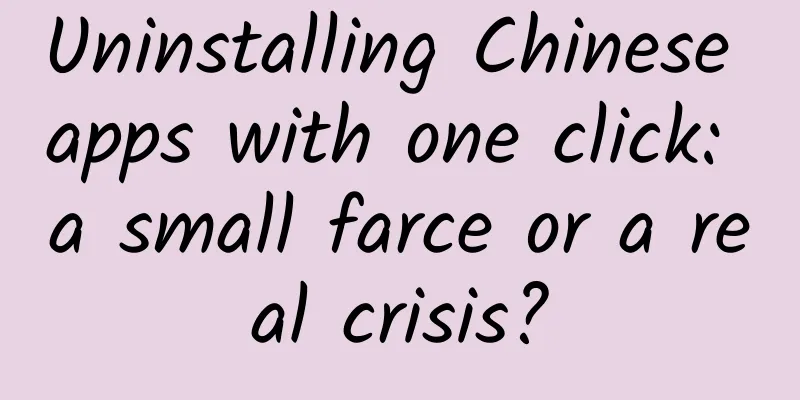Uninstalling Chinese apps with one click: a small farce or a real crisis?

|
Recently, an application called Remove China Apps has become popular in India. It does not attract users with its unique page design or novel product features, but simply because it can scan users' phones, list Chinese applications, and let users decide whether to keep or uninstall them. Within two weeks of its launch, Remove China Apps topped the Google Play rankings with a score of 4.9 and received more than 200,000 reviews. However, after a brief period of glory, Remove China Apps was removed from Google Play on June 2, and its developer OneTouchAppLabs also confirmed the news on Twitter. Coincidentally, another app, Mitron, also caused a lot of controversy on social media such as Twitter. Mitron is a competitor to TikTok, and its product design and functions are quite similar to TikTok. Previously, many Indian users gave TikTok one star on Google Play because of inappropriate content, and then abandoned TikTok and embraced Mitron. This made Mitron quickly become popular with 5 million downloads in just one month. The popularity of these two apps and the public opinion events they triggered are closely related to the recent social panic caused by the epidemic in India and the rise of anti-China sentiment in the country. When the boycott sentiment spread to the Internet industry, it really made Chinese developers going overseas "sweat". In this situation, everyone obviously needs to be more fully prepared on issues such as content review. As the world's second largest mobile Internet market, India's boycott of Chinese Internet products has undoubtedly sent some bad signals. The transfer of emotions Starting last month, a large number of Indian users gave TikTok one star on Google Play after a TikTok blogger uploaded a video of a sulfuric acid attack and mocked the victim, causing widespread controversy. Many users began to express their anger and boycott using content with tags such as #BanTikTok #IndiansAgainstTikTok, believing that some videos in TikTok would promote racism, domestic violence, etc. TikTok's rating on Google Play once dropped to 1.3. After Google officially deleted some comments containing hate speech, TikTok's rating recovered. However, voices calling for a "boycott of Chinese products" can often be seen on Indian social media, with some well-known opinion leaders also guiding the direction of public opinion. On the OneTouchAppLabs website, the development team wrote: "Thanks to Sonam Wangchuk for his contribution to promoting Indian manufacturing." Sonam Wangchuk is a famous Indian engineer and educator (also the prototype of the character in "3 Idiots"). He once called for "giving up the use of Chinese software within a week, giving up the use of Chinese hardware within a year, and boycotting all Chinese-made products." The official website mentioned that the product was developed for educational purposes and only helps users identify the development source of an App. It does not encourage or force users to uninstall any App. However, Remove China Apps is not precise and does not give an answer to the definition of "Chinese Apps". For example, a foreign media outlet said: "After user testing, it was found that the video conferencing software Zoom was also listed. Does the fact that its founder is Chinese mean that Zoom is a Chinese App?" Some people also said after the test, "I installed it on the Redmi Note 9 Pro Max, and only 6 Chinese apps were detected, and a large number of Xiaomi pre-installed apps were not detected." Apparently Google Play doesn’t buy into its claim of “educational purposes.” According to TechCrunch, Remove China Apps violates Google Play’s Deceptive Behavior Policy, which prohibits apps from changing user device settings and functions outside of the app without user consent, nor encouraging or motivating users to delete and disable third-party apps. During the period when Indian netizens boycotted Chinese apps, Mitron became one of the many "beneficiaries". After many users abandoned TikTok, they downloaded Mitron as an alternative app, which allowed Mitron to receive 5 million downloads in just one month. However, many professionals are not optimistic about Mitron. According to Zhixiang.com, Mitron has security vulnerabilities. For example, users can authorize Google accounts to log in to Mitron, but the developer did not set a token key for authentication when using authorization, resulting in hackers being able to log in to any user's profile with a public user ID without having to enter a password. Mitron purchased source code from TicTic developer Qboxus. Foreign media Indian Express quoted a cybersecurity researcher from Counterpoint as saying, "Mitron does not have any additional firewalls on top of the source code, has a weak privacy policy, and has data security issues." Based on Mitron's possible privacy and security issues, Mitron was removed from Google Play. However, the removal of Mitron and Remove China Apps further angered already dissatisfied Indian users. "It is understandable that Mitron was removed because of copyright and security issues. But Remove China Apps is a good app that helps remove a lot of spam. We need it to help boycott and delete Chinese apps," a Twitter user wrote. Made in India However, some more rational Indian users said that it is unrealistic to get rid of Chinese manufacturing, unless they completely stop using Chinese brand mobile phones. In 2019, Xiaomi, Redmi, OPPO, and vivo accounted for more than 60% of the Indian market. With the popularity of smartphones in India and the maturity of domestic consumer Internet, Chinese manufacturers have begun to go overseas and bring applications to India. For example, the news information NewsDog seized the "multilingual" characteristics of India and translated into 10 mainstream local languages of India after its first English version in 2016, thus achieving success. According to FactorDaily data at the beginning of 2019, 44 of the top 100 Android apps in India were developed by Chinese companies, compared to 18 a year ago. According to Sensor Tower, five of the top ten apps in India in 2018 were from China. Not only have Chinese apps taken root in India, but Chinese capital has also taken up half of India’s unicorns. Alibaba has invested in financial technology company Paytm, food delivery company Zomato, logistics company Xpressbees, etc., while another giant Tencent has invested in food delivery company Swiggy, travel company Ola, financial technology company NiYO, etc. However, the Indian government has recently tightened its investment policy in India, requiring all neighboring countries to approve their investments in India, and changes in the ownership of existing foreign-invested Indian companies also require government approval. The changes in investment rules are aimed at curbing "opportunistic acquisitions" during the epidemic. Some people believe that given that other neighboring countries of India have little ability to acquire Indian companies, this new rule is clearly aimed at China. Behind the voices of "boycott Chinese Products", India wants to convey "Made in India". On May 12, Indian Prime Minister Modi said that under the influence of the epidemic, India needs to rely on self-reliance and encourage "Made in India". India has long encouraged the rise of local technology companies, hoping to "replicate" the success of Alibaba and Tencent in India. Interestingly, after many Indian users uninstalled Chinese apps, they found that there were no other alternatives available. In the Remove China Apps comments section, there is a comment: "This app is very good, but I want to know what to use instead of uninstalling all these apps? For example, many of us use SHAREit to transfer files. If the developer can recommend some good apps, I will definitely give it five stars." In 2017, the Indian Ministry of Defense ordered the armed forces to uninstall 42 Chinese applications classified as "spyware". These applications include UC Browser, UC News, SHAREit, and WeChat. In the future, Chinese apps may face more severe obstacles in India, but not only in India, because as China's internationalization strategy advances, boycotts with national sentiment will definitely occur. Remove China Apps is not the beginning, nor the end. However, unlike the industrial era, boycotting entities will have an impact on the industrial chain. In the Internet era, boycotting an app itself is not very meaningful. As the user said, after the user experience is formed, you really can't quickly find a substitute. For developers, the huge data and technical foundation accumulated behind an application are also difficult to be easily replaced. |
<<: Ma Huateng vs. Cook! The second round of WeChat and Apple is exciting
>>: WeChat teaches you how to set up a street stall: This score is your signboard
Recommend
The Geminid meteor shower will reach its peak on the 14th! Seven things you want to know when watching the meteor shower
Every December, what astronomy enthusiasts look f...
Will India, chosen by Cook and Guo Taiming, become the next world factory?
Indians like to call their country "Incredib...
Collection | Re-understanding 100 keywords for new media operations
In the Internet age, new media has almost reconst...
Vocational education industry promotion methods and delivery platforms
With the increase of competitive pressure, educat...
5 major APP overseas promotion channels, use them!
For most mobile application APP teams, designing ...
Baidu's mass production of the world's first L4 autonomous driving car, Apollo, is of greater significance than just
On July 4, at the second Baidu AI Developer Confe...
What superpowers do growth hackers need?
I've recently been reading Fan Bing's &qu...
How to promote to KOL? Here are 3 ways!
Why do KOLs ignore me? How to convince KOL to pro...
The "huge grid" that wraps the earth - the longitude and latitude coordinate system
I believe that most people in modern society use ...
How much do you know about facial recognition?
In recent years, with the rapid development of ar...
Why do all mobile phones, not just iPhones, prefer one-piece bodies?
If you pay attention to the new phones released in...
The fish in the river collectively "turned upside down"! The "culprit" turned out to be this dangerous car washing behavior...
Author: Duan Yuechu, Huang Xianghong, Huang Yanho...
How to organize an event with almost zero budget, free event
Last time a colleague told me that their annual g...
A red ocean project with simple operation from zero foundation, a way to make money with a visual feast
A red ocean project with simple operation from ze...
Tips for cold start operation and promotion of Tik Tok account!
“It’s hard to create a new Douyin account now!” R...









